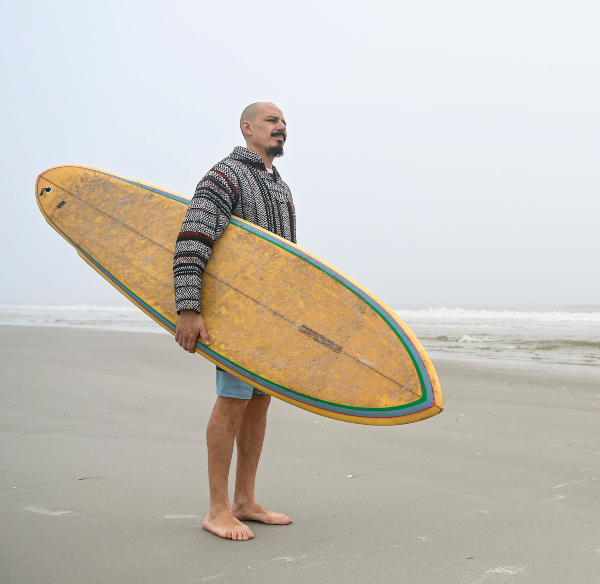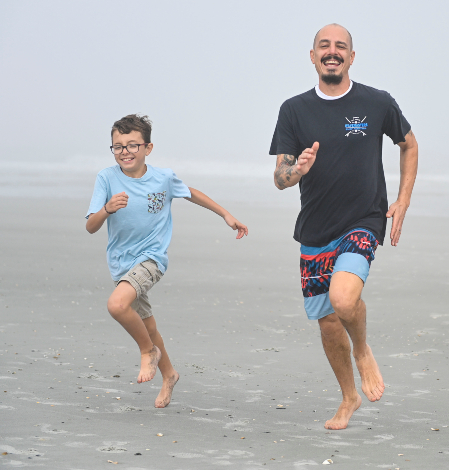Catching Waves Helps Army Veteran Let Go of Anxiety, Build a New Life

Leaving the structure of military life and venturing into the unknown as a civilian is a monumental change. Any change can cause stress, and for many people the stress can lead to anxiety.
According to a 2020 Wounded Warrior Project® (WWP) survey of the wounded warriors it serves, 77% of warriors report experiencing anxiety after leaving military service.
But anxiety can be hard to pin down. According to Mayo Clinic, anxiety symptoms can include feeling nervous or tense, having trouble sleeping, having a sense of impending danger, and having difficulty controlling worry. Anxiety can also cause physical symptoms, including increased heart rate, sweating, and hyperventilation.
Hypervigilance, or the urge to constantly protect oneself from unseen dangers, can signal underlying anxiety. Some examples are repeatedly checking windows and doors or carrying a handgun “for protection.”
Like many other veterans, Felix Santiago experienced that type of anxiety during his transition out of the Army. His wife, and fellow veteran, Heather, helped steer him toward Wounded Warrior Project® (WWP), where he found support and new tools to understand and manage what he was experiencing at the time.
“I came back from deployment to a town I didn’t grow up in – I didn’t know anyone,” Felix recalled. Two months after leaving the Army and moving to Jacksonville, Florida, he joined the National Guard. He knew he missed the camaraderie and the sense of purpose. That’s where he met Heather, who also works for WWP.
The Next Wave
Through WWP, Felix attended a surfing event that gave him a new perspective.
“Surfing helped me feel at ease with not being in control,” Felix said.
“When you’re out on the water, you’re not in control, really, of your surroundings. You have to go with it and ride the wave. It helped me be out there with myself. You fall and you feel like you’re being held under – but relax and you come back up. Every aspect of the sport of surfing has taught me to relax and ease into my daily life.”
Surfing gave Felix a deeper understanding of how to go with the flow and make a smoother transition to civilian life. Felix learned that “you can’t be full of anxiety when you’re out there trying to catch the next wave.”
With help from WWP, he attained a teaching certification and found a new career as a special needs teacher. After the pandemic, he again went with the flow and was able to parlay his skills into work with a nonprofit that provides purpose and meaning to adults with special needs.
A New Path
Anxiety affects people of all backgrounds, including veterans who might also manage other mental health challenges. In fact, anxiety ranks third among the top five health concerns veterans reported via the WWP survey:
- Sleep problems (84%)
- PTSD (83%)
- Anxiety (77%)
- Back, neck, or shoulder problems (74%)
- Depression (72%)
Felix found support in veteran connections through WWP and allowed the life lessons of surfing to carry him through both professionally and personally. He and Heather are raising a family and Felix gets plenty of quality time with his middle school-aged son, especially when mom is away serving in the National Guard. Surfing has become part of the father-son bond.
He and Heather are raising a family and Felix gets plenty of quality time with his middle school-aged son, especially when mom is away serving in the National Guard. Surfing has become part of the father-son bond.
“My son has been in the water with me since he was 5 years old,” Felix said. “I enjoy it even more because not only did I not grow up near the water, but now I’m here and I’m able to teach my son and be in the moment with my son, with no electronics ̶̶̶̶ that’s special to me.”
While transitioning to civilian life has many aspects, the ability to manage daily anxiety can be an important step in smoothing the process.
Tapping into a support system like WWP has been important to Felix’s transition. He explained that he was looking for a team that would boost him and provides “the positive vibes and the camaraderie I missed from being in the Army.”
“I’m thankful that I found a way to reinvent myself and acquire the tools I needed to help me with the anxiety,” Felix said. “I’m also glad to be able to practice surfing and pass down what I have gained to others.”
Felix would like other veterans to know that “it’s possible to focus on the things you can control versus the ones you cannot.”
WWP offers mental health services for veterans and families coping with the invisible wounds of war. Get connected today.
Contact: Raquel Rivas — Public Relations, rrivas@woundedwarriorproject.org, 904.426.9783
About Wounded Warrior Project
Since 2003, Wounded Warrior Project® (WWP) has been meeting the growing needs of warriors, their families, and caregivers — helping them achieve their highest ambition. Learn more.